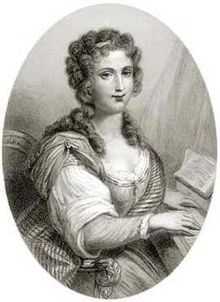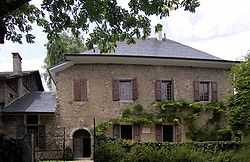Françoise-Louise de Warens


Françoise-Louise de Warens, born Louise Éléonore de la Tour du Pil, also called Madame de Warens (31 March 1699[1] - 29 July 1762[2]), was the benefactress and mistress of Jean-Jacques Rousseau.
She was born in Vevey, into a Swiss Protestant family who had immigrated to Annecy, but became a Roman Catholic in 1726 to receive a church pension which had been instated to increase the spread of Roman Catholicism near Geneva, then a bastion of Protestantism.
Without doubt, she was a very controversial woman, leading a liberal life for a woman of her era. She annulled her marriage to M. de Warens in 1726 after failing in a clothing business that she was putting together. Rousseau met her on Palm Sunday 1728, forever changing both their lives. It was said that she was a spy and a converter for Savoy, then part of the Kingdom of Sardinia. She gave Rousseau the education he lacked and fulfilled his hungry spirit, his need for love. Rousseau never forgot her. When he returned from England in 1767 and was wandering through France and Switzerland, he found out in August 1768 that his maman, as he called her, had died in poverty six years before, in Chambéry.
Notes
- ↑ Albert Gonthier, Montreux et ses hôtes illustres, éditions Cabedita, 1999, ISBN=978-2-88295-267-7, p. 19,
- ↑ Les confessions, de Jean-Jacques Rousseau, éd. intégrale publiée sur le texte autographe conservé à la Bibliothèque de Genève, précédée d'une introduction et suivie de notes et d'un index, Publié par Garnier frères, 1930, note n° 135, page 240, voir